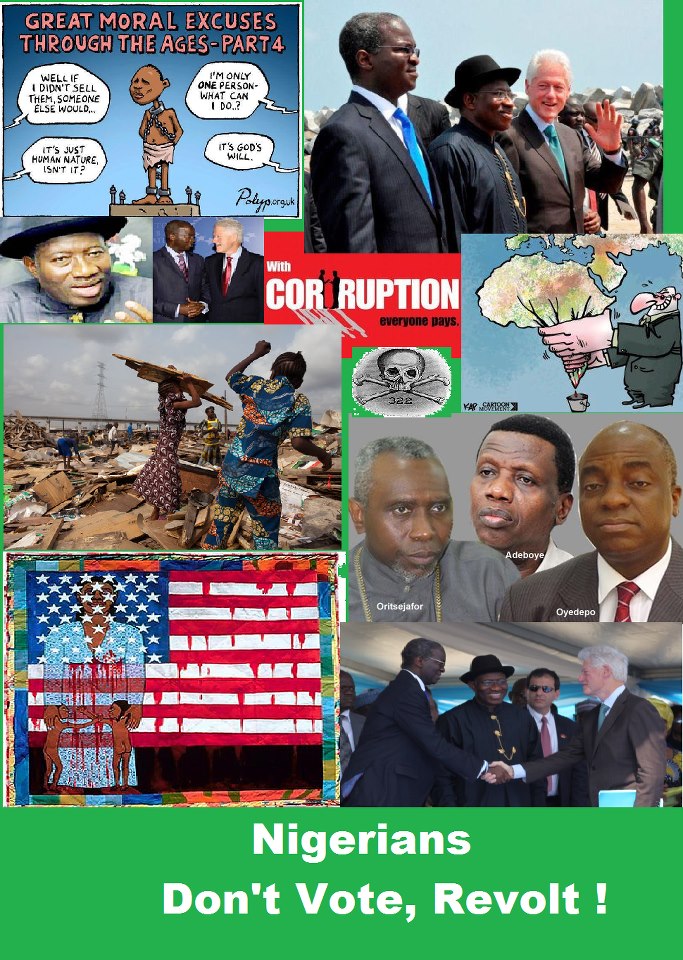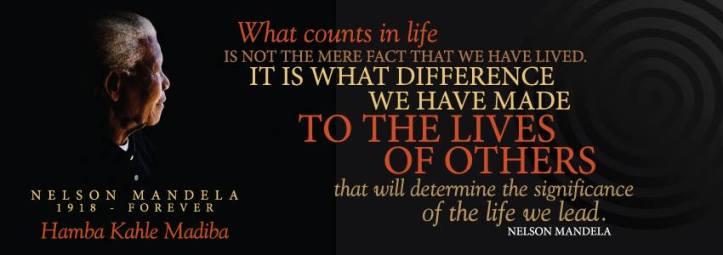Umuntu ngumuntu ngabantu – it means you must serve your fellow man. You see? You must respect and serve your fellow man faithfully. That’s what, because without their support you can never progress. That’s what it means. – Nelson Mandela
Anyone who has experienced a certain amount of loss in their life has empathy for those who have experienced loss. – Anderson Cooper
Look, I’m a cancer survivor, all right? So I have great personal empathy for people who have pre-existing conditions and can’t get insurance. – Carly Fiorina
There is a man who lives near my mother’s house, who is blind. This fellow also happens to attend the same church which mother belongs to, and I see him almost each month seated at the bus stop, or walking around the neighbourhood, assisted only by a white cane.
I can’t even begin to imagine what challenges this man has had to face, or indeed what challenges his condition presents him every single day. Thinking about it alone gives me a chill, although something tells me his experiences have got to be unpleasant, very hard. Not being able to see clearly, or not seeing at all, the sunlight (or in the case of Manchester – the grey skies + rain), the landscape, birds, people, the innocence on a child – the smiles on their faces; cars, television…the world; needing help with cooking, cleaning, shopping, etc; a life in which just being able to move about in one’s own house is probably a bit of a challenge…the apparent helplessness, I just can’t even begin to imagine it.
And while there is research out there that suggests that people with blindness have heightened senses, (see other links here and here) as the above links try to explain, living with blindness is still something that those of us who have sight can’t completely comprehend, even after a visit to Dans Le Noir (see another review here).
A different example was given to me by a friend, who quoted this story which includes the following paragraphs:
“The UN identifies long-term solitary confinement as a form of torture and the effects on Warsame were clear. He became apathetic, lethargic and depressed. He rarely left his cell to exercise in the locked cell adjacent to his own. The social isolation was tortuous and agonizing.”
…
“At the sentencing, the judge noted that he had “seen nothing in the record or the last five years of proceedings demonstrating that Warsame poses an immediate danger.” Why then had he refused to suspend or modify the SAMs?”
…
“While the judge also observed “nothing that adequately demonstrates that Warsame was part of a specific plot against the United States, and very little that suggests he was especially useful to Al Qaeda,” he refused to impose a sentence of time-served, instead adding another twenty-four months, for a total of ninety-two months, or almost eight years.”
…
“The judge’s deference throughout the case to the government’s bloated claims of national security is disturbing. Yet evidence indicates that the court’s deference is not aberrational but replicated in other terrorism cases in US courts. The plea deal suggests that Warsame never posed a security threat. That conclusion is reinforced by Warsame’s deportation: allowing him to simply leave the country contradicts the notion of immediate danger the government repeatedly asserted Warsame’s unmonitored communications posed.” – Article written by David Thomas, Criminal defence lawyer, How Mohammed Warsame Became an Accidental ‘Terrorist’
This post is not about blindness, unique restaurant experiences, the challenges people with blindness face or how US law treats suspect terrorists.
Instead, in my daily life, I have often encountered or heard views from capable young people who feel a sense of helplessness. That the world around them does not understand their circumstances, and is incapable of helping them.That their plight is solely up to God. They have little or no role in turning their own fortunes.
It causes me a lot of sadness.
They feel left out, that nobody seems to care, that they are powerless, with no hero either in their family or in the leadership of their society, region, country who can confront this helplessness that is causing them much stress, and slowly dragging them deeper and deeper into depression. I meet youngsters with a deep sense of deprivation and failure; who think they have no hope and can do absolutely nothing to transform their own lives for the better. Most are Africans, or of African heritage.
It’s one thing meeting a disaffected person, and giving them advice (even good advice) that could help them plan how to get out of their hardship zone, it’s quite another thing assisting them, step by step, practically and over a period of time, in overcoming their challenges. I find the latter more helpful, but often the constraints on my own life curtails how much helps I am able to offer; that wretched feeling when you know precisely how a certain situation can be tackled, made good and turned around, having tamed similar situations in the past, yet you are unable to offer much help because of your own problems…
Which is why I have great respect for organisations such as Turning Point. However, most of these youngsters I meet doubt whether such organisations can do much to help them, and in fact tend to think such organisations are only targeted to former addicts, or people have been made homeless or have met some domestic catastrophe…
The problems I hear vary from the absence of motivation and financial constraints, to frustration with leadership and life; including family entanglements and baggage from the past which they can’t quite separate themselves from, or reconcile with the present. Last week, a fine young man wrote me:
I concluded one thing and it’s how us black people as a whole lack hope. We say all this stuff about our belief in God and the love and faith we have for him. But we lack hope. We allow ourselves to be forever imprisoned by these unnecessary emotions of hate, greed, complacency and inconsistency. We are right now incapable of having the dreams that our former leaders fought with and had till they died, Kamuzu had a vision, the same way Mandela had his. That’s why they were good friends. But this generation we struggle with conviction, for we are too busy stuck here on social media websites posting all these things and having discussions. It is as if we don’t have what it takes to take that step forward for change. … But it goes back to our lack of conviction as a whole. We lack that power that our past ancestors had before, we lack that vision. Africa now has no dreamers but it is … mercenaries who dream to keep Africa at bay, and because we don’t have what it takes to dream big and beyond, to trust God for our talents we are stuck here, writing bitter statements and statuses about what’s happening to our brothers and sisters. I ask myself everyday if I care, and what should I do? But the inner spirit within me reminds me that it is not up to man to say I will change the world with my own works. … I don’t have that will power within but I know where it comes from, only God…
To me these kinds of statements come in three main forms. Grievances against general trends within society their present society, and back home in Africa; grievance against a certain type of thinking / practice, which in some forms manifests itself in”…too busy stuck here on social media websites posting all these things and having discussions” ; and grievance against public / private equity institution (both abroad and back home in Africa) which ‘fail’ to provide them with capital, or whose requirements in ascertaining suitability of a loan (which the aggrieved thinks is necessary to reverse their fortunes) to the recipient are too high to meet.
In another form, the grievances highlight the inability of even an afflicted person, to devise a solution to their own problems. Yesterday, I was speaking to a young man in Malawi who complained about how there is a total lack of leadership in local government, and how even the simplest of ideas get shot down, not only by the leadership – who do little except complain and ‘go around in circles‘, but also by those who are affected:
“Man, things in Malawi are bad, I don’t even know what will happen next, except that we are going down. The 60% pay increase civil servants were offered in early February is yet to be effected. There has been no follow-up, and i don’t think its going to happen. Our bosses invite us to meetings, every other day, where the only outcome is throwing blame and finding excuses. …
We were meant to be paid on the 21st [November], but up until now [8th December] we have not been paid. Salaries, allowances have not paid. It’s a mess. To add insult to injury our duties have been increased and we have to pay tax, even when we are not being paid. Fuel in the country is going up, the dollar is at K417 on the black market at K450, and since there is no money to pay us, we will be sent on holiday next week because the coffers are dry. But what will we eat if we have not been paid? People are disgruntled,, right now the president is going to South Africa, and after that to Kenya for some celebrations ….more travelling and money pointlessly spent. Madness really on behalf of our president. 50 years of independence achimwene [brother], and we keep going backwards….
And when you make a suggestion, even the guy standing next to you, on the same level as you, who is also suffering like you are, shoots all your ideas down, but they can’t even come up with a single idea??”
He goes on to say:
I don’t see a leader amongst any of them. I havent even registered to vote. These guys don’t deserve to be presidents. They keep recycling the same old politicians with the same old ideas. So where do you think our country is going to go if youngsters are not given a chance? Sadly we live in society that is so embedded in “bola moyo” [At least we are alive] . That’s what is sooooo heartbreaking. People that let others take advantage of them because of poverty or ignorance


[…] Empathy – the key to societal harmony and global progress […]
LikeLike
[…] Empathy – the key to societal harmony and global progress (malawiace.com) […]
LikeLike
[…] Empathy – the key to societal harmony and global progress (malawiace.com) […]
LikeLike
[…] Empathy – the key to societal harmony and global progress (malawiace.com) […]
LikeLike